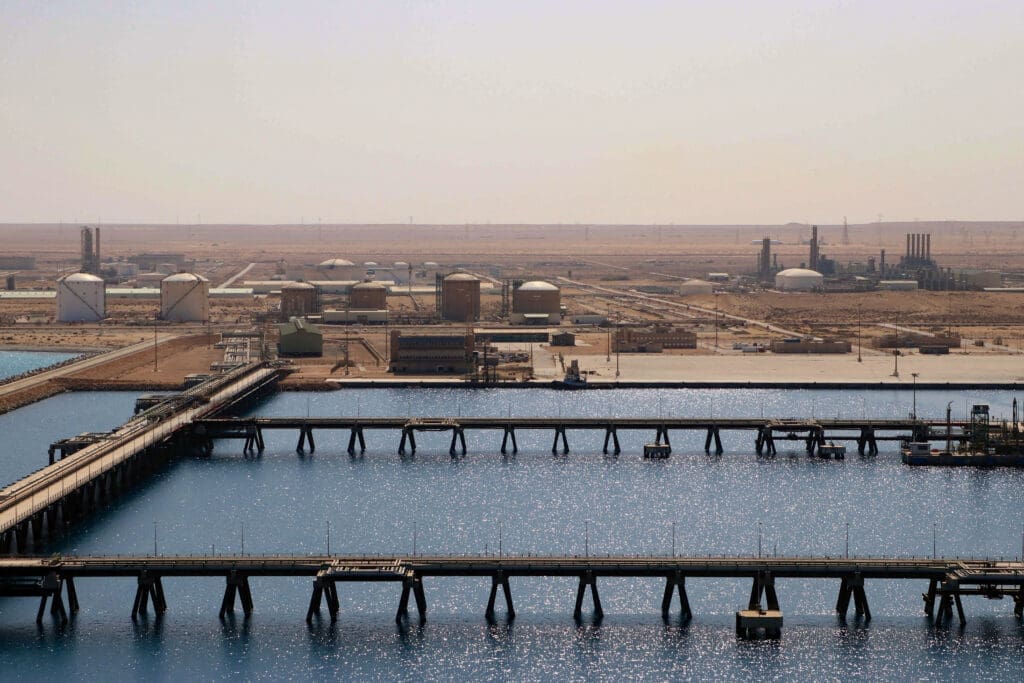The Mediterranean is a region more practiced at crisis management than resolution. From Cyprus to Palestine, Lebanon to Libya, migration to energy, the region’s chronic fault lines simmer beneath the surface, flitting between active and dormant states like geopolitical volcanoes. Time and again, the states attempting to contain or capitalize on these crises end up intensifying their fallout, turning volatility into a defining regional feature rather than an exception.
This dynamic is playing out right now as Libya’s long-burning political crisis and the battle over the Mediterranean Sea’s underwater gas fields are being dangerously combined by Türkiye—along with partners including the United States, Italy and the United Arab Emirates—in the hopes of creating a geostrategic fait accompli in its favor. However, the volatility churned up by this gambit raises the likelihood of a catastrophic eruption, devastating the stability and prosperity of Libya and Mediterranean energy markets, while leaving the region mired in political toxicity for years after.
A Bonfire of Crises
The poly-crisis currently brewing over the offshore gas fields between eastern Libya and the Greek island of Crete has been a long time coming. A consortium of oil companies is preparing to prospect Libya’s offshore fields as their state backers enforce a corrosive political status quo on an already beleaguered nation to ensure privileged access. Meanwhile, Greece is deploying its navy to Libyan waters, determined to disrupt an enterprise it fears will cripple it for generations.
That is because this interplay is not merely about selling gas. Türkiye has long perceived Libya as a catalyst for its “blue homeland” project, a plan to secure sovereignty over large swathes of the Mediterranean and the financial, geopolitical and security benefits that would accompany it. Given Greece’s parallel pursuit—and rancorous history with Türkiye—it is the natural antagonist of this policy.
Back in 2020, it was Athens priming the pump. Multinationals were prospecting natural gas fields off Cyprus, as Greece joined with local powers like Egypt and Israel, as well as regional powers like the United Arab Emirates, in the Eastern Mediterranean Gas Forum (EMGF). Thus, Greece was locking in its economic domination, while marketing itself in America as a new-look, regional security provider.
The core showdown between Athens and Ankara here, is a perception over who should have the prevailing economic rights over the eastern Mediterranean. Greece, observing the United Nations Convention on the Law of the Sea (UNCLOS), perceives a right to a 200-mile exclusive economic zone around each of its thousands of islands, which would essentially allow it to dominate half the Mediterranean and its hydrocarbon riches.
Türkiye and other regional states like Libya and Israel, along with the United States, are not signatories to UNCLOS. Ankara instead contends that a just maritime law should privilege the rights of continental land masses over islands. Given it has the longest contiguous coastline, this would see it dominate the eastern Mediterranean, strangling the Greek islands while increasing the share of other large littoral countries like Egypt and Libya.
This dynamic makes Mediterranean gas inherently confrontational, especially as both Greece and Türkiye advance legal contentions that would result in their domination over the other while seeking to leverage their gas holdings for broader geopolitical benefits. In 2020, Türkiye escaped Greece’s geopolitical snare by using its navy to disrupt excavations, while offering Libya’s government protection against an assault backed by EMGF members on its capital Tripoli in exchange for an agreement demarcating maritime boundaries on Türkiye’s terms.
Poxy Libyan Proxies
Türkiye’s savvy Libyan engagement—anchored by a maritime deal that disregarded claims of even major Greek islands like Rhodes and Crete—allowed Ankara to establish diplomatic, legal and militarily inroads across the region. Greece could only fallback upon European Union solidarity, while tensions nearly escalated into war as French and Turkish naval forces squared off in 2020. But falling global gas prices, high extraction risks and unviable infrastructure costs defused the crisis.
Still, it was Libya who bore the brunt, as heightened geopolitical stakes deepened stakeholder divisions and incentivized maintaining Libya’s political crisis rather than resolving it. European hostility to the Türkiye-Libya maritime deal shaped its Libya policy, refocusing efforts to enforce the UN arms embargo onto Turkish assets and generating support for the authoritarian Khalifa Haftar as a foil, despite his record of atrocities.
The result was weakening Libya’s already fragile sovereignty. Instead of addressing the root crisis of political legitimacy, foreign actors—including Türkiye and Europe—manipulated Libya’s divisions for strategic gain. As regional rivalries cooled, Türkiye then leveraged these gains into a broader rapprochement with the UAE, Egypt and France, translating them into lucrative business and security deals on both sides of Libya’s divide.
The effect has been to entrench two de-facto dictatorships with no local constituencies, both backed by the same foreign powers. Türkiye expanded its reach with new energy deals and military privileges, while it and other countries helped Libyan factions fragment the national oil sector and divert revenues through new intermediaries. The creation of the Arkenu oil company symbolizes Libya’s erasure from its own resource wealth—an emblem of external domination masquerading as partnership.
The Best Laid Plans
Türkiye has skillfully built a platform of political influence in Libya—leveraging its ties with elites, forging new partnerships with EMGF members, and expanding energy cooperation with U.S. and European companies—ensuring any windfall flowed in their direction. But despite these realignments, Libya’s fragility and the enduring antagonism between Greece and Türkiye steer the region toward perpetual crisis.
A few dynamics are driving this trend. Foremost among them is the sheer scale of Libya’s offshore gas reserves, estimated at 122 trillion cubic feet. This potential goldmine has attracted an insecure Libyan prime minister eager to trade access for international backing, a Europe desperate for post-Ukraine energy alternatives, and a new U.S. administration motivated by raw commercialism.
Libya’s elites have all courted Washington in various ways, but energy remains the key currency. During a recent visit, Trump advisor Massaad Boulos brokered deals for Hill International and Exxon Mobil to survey and develop offshore gas fields.
This bought America into ready-made coalitions: Türkiye’s state-owned oil firm had had already partnered with Libya’s national oil company (NOC), and the Hill International deal linked the U.S. company to an existing consortium between Libya’s NOC and Italian energy giant ENI. In order to stimulate closer cooperation, Turkish President Recep Erdogan recently hosted a special conference with his Italian and Libyan counterparts.
With momentum building, Ankara is launching a new charm offensive towards Haftar and eastern Libya, using the familiar model of leveraging military support to coax mutually beneficial contracts as the foundations for a political relationship. The prize is getting Libya’s speaker of parliament—a man who unilaterally speaks for the otherwise inert body in eastern Libya that cannot meet quorum or cross Haftar—ratifying its maritime agreement. This would strengthen Türkiye’s claims over Mediterranean energy zones and open the door for privileged access.
But these mounting foreign interests in Libya are causing the country to buckle. Haftar, empowered by international attention, is amassing weapons and reviving ambitions to conquer Tripoli. In turn, Prime Minister Dbeiba, eager to pre-empt Haftar, has pushed Libya’s first energy concessions in decades to endear himself to the international community and launched a war in the capital to centralize power.
An Eruption on the Horizon?
With Libyans becoming increasingly impoverished and frustrated, and the political stakes rising and growing more lucrative, pressure is building toward a violent explosion. International dynamics are not helping, either. Greece, feeling provoked by Türkiye, as well as Haftar’s political promiscuity, is now feuding with its erstwhile Libyan partner. Haftar responded over the summer by exporting migrants to Crete, ostensibly to pressure Athens’ right-wing government. Instead, Greece seized one of Haftar’s arms shipments, reminding him of their importance to his operations, deployed their navy, and then launched a charm offensive to win Haftar back.
While Türkiye may believe its energy alliances with the U.S., Italy, and others buffer it from unified European opposition, it may simply be fueling new rifts. Haftar’s weaponization of migration taps into Europe’s deepest anxieties. Meanwhile, Exxon Mobil has recently discovered new gas fields off Cyprus, which is working with Egypt to expand exports—rekindling the Eastern Mediterranean dispute.
Greece’s navy is already deployed, another EU member-state, Cyprus, is reactivating its energy interests, and other regional players like the UAE, Egypt and Israel may be tempted to inflame tensions further to gain leverage over both Türkiye and Europe.
The rational path forward would be diplomacy: a multilateral forum to equitably manage Mediterranean resources and a UN process that prioritizes Libyan sovereignty over foreign proxy politics. Even a realpolitik view would see such steps as the key to stability and long-term economic gain. Yet solutions remain unconsidered. Instead, overlapping rivalries, short-termism and conflicting maximalist ambitions across the region are stoking the volcano that is Libya and the eastern Mediterranean toward another predictable, yet preventable, eruption.


